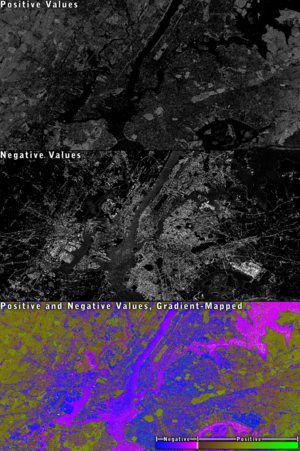evi
|
Contents: Description, Arguments, Usage, Examples, Images, Related Functions, Source Supported Under Version: > 1.00
Description Generates an Enhanced Vegetation Index map
Arguments and Return Values Arguments: 1- or 2-dimensional greyscale images representing near-infrared, red, and blue spectral bands (all three are required), and optionally several coefficients. Return Value: A float greyscale image
Usage Syntax: evi(nir, red, blue [, l = VAL] [, c1 = VAL] [, c2 = VAL] [, gain = VAL]) The optional l, c1, and c2 parameters refer to coefficients in the original formula, with l representing "the canopy background adjustment that addresses non-linear, differential NIR and red radiant transfer through a canopy", and c1/c2 being "the coefficients of the aerosol resistance term, which uses the blue band to correct for aerosol influences in the red band". If not specified, they default to 1.0, 6.0, and 7.5 (the values from the source paper) respectively. The gain parameter is a simple scaling factor and is included only for complete representation of the original formula. It defaults to 1.0 if not specified. This function is part of the larger class of vegetation-index methods used in satellite image-processing. See ndi or this discussion of related functions for more detailed information. EVI is of the subtype which will return both positive and negative values. Positive values generally indicate the presence of vegetation (with greater values indicating healthier vegetation). Negative values generally indicate a lack of vegetation (water, rock, soil, etc.). The formula used is: EVI = G * ((NIR - Red) / (NIR + C1 * Red - C2 * Blue + L)) This formula was obtained from "Tropical Wet Realms Of Central Africa, Part II" (Paul R. Baumann, 2009). Note: as the example below indicates, this formula generates results over a much broader range than most other vegetation-index formulas. As a result, even when the results are normalized, they are "grainy".
Examples dv> nir 2000x1000x1 array of float, bsq format [8,000,000 bytes] dv> r 2000x1000x1 array of float, bsq format [8,000,000 bytes] dv> b 2000x1000x1 array of float, bsq format [8,000,000 bytes] dv> result = evi(nir, r, b) Generating an Enhanced Vegetation Index image. 2000x1000x1 array of float, bsq format [8,000,000 bytes] dv> max(result) 1414549.625 dv> min(result) -1644825.125
|
DavinciWiki Mini-Nav Bar Contents
Contact Developers
All other topics
Recent Library Changes Created On: 07-16-2012 |

